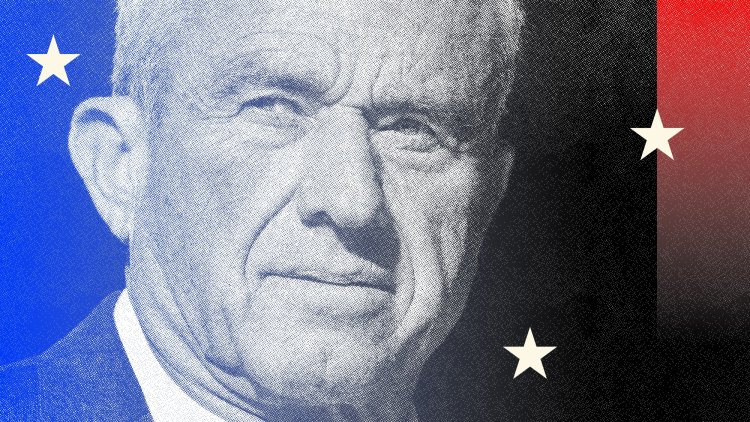Another RFK Jr. Surprise
With Joe Biden out of the race, the third-party candidate suddenly appears to pose a bigger threat to Donald Trump.

Before President Joe Biden dropped out of the 2024 presidential race, Robert F. Kennedy Jr.’s third-party campaign threatened to tip the election to Donald Trump. Now that Kamala Harris has replaced Biden on the ticket, Kennedy could still end up playing spoiler—in the Democrat’s favor.
For most of this year, conventional wisdom has held that Kennedy would hurt the Democratic candidate more than the Republican. This was an imperfect prediction for many reasons, not least because Kennedy was altogether excluded from plenty of surveys. But when his name did appear as an option for respondents, polls showed him reducing both major candidates’ support—a little more so for Biden. A May New York Times poll, for example, had Trump leading Biden by an extra point when Kennedy was included. In a close race, a single percentage point can make all the difference.
Recent history also suggested that the presence of Kennedy and other third-party candidates would help the GOP. In 2000, Ralph Nader siphoned off just enough of Al Gore’s support to tip the election, and Jill Stein’s 2016 Green Party bid may have helped bring Trump to the White House. Democrats feared that Kennedy would be even more damaging this November, given Biden’s age and unpopularity and Kennedy’s membership in a Democratic Party dynasty with instant name recognition. To make matters worse for the incumbent, Kennedy appeared to be performing strongest precisely where Biden was weakest. A November 2023 Siena poll of six battleground states, for example, showed Kennedy beating Biden with independents and voters under age 45.
[Read: The first MAGA Democrat]
Since Biden dropped out, however, the dynamic appears to have shifted. In a Marquette survey released on Wednesday, for example, Harris’s national lead grows by two points when Kennedy and other third-party candidates are included. In the New York Times polling average, Harris leads Trump by one point nationally whether or not Kennedy is included. But in the crucial swing states of Wisconsin and Pennsylvania—with the important caveat that state-level polling data are still sparse—Kennedy already appears to be giving her an edge. “There’s no doubt that Kamala Harris has picked up some undecided and third-party support since she’s become the nominee,” David Wasserman, a senior editor and an elections analyst for the Cook Political Report, told me.
Kennedy has always performed strongest with independent, undecided, and, most significantly, younger voters—anyone who is unhappy with the two major-party options. Shockingly fit at 70 years old, Kennedy marketed himself as the cooler, younger alternative to Biden (81) and Trump (78). With the 59-year-old Harris in the race, Democratic-leaning voters who couldn’t bring themselves to vote for the visibly diminished Biden now have another option. David Byler, an election analyst at Noble Predictive Insights, told me that when Biden was running, some Democratic poll respondents selected “Not sure” or “RFK Jr.” as a way of signaling their reluctance to vote for either major-party nominee. “Now that Harris is the candidate, Democrats are more unified,” he said.
The problem for Trump is that the other main bloc of Kennedy voters is made up of people who are drawn to RFK Jr.’s fringe opinions, conspiracy theorizing, and general anti-establishment politics. Kennedy is a regular guest on the edgy-podcast circuit. His countercultural views and extreme positions have proved seductive to many young and otherwise disillusioned voters—the sorts of people who hang on every word of Joe Rogan, Theo Von, or Russell Brand. Kennedy, whom Rogan calls “the only one who makes sense to me,” has embraced this crowd.
In May, I sat in the balcony of the Ryman Auditorium, in Nashville, observing a Kennedy campaign event featuring a handful of comedians. That night, Brand characterized The New York Times as propaganda, called Dr. Anthony Fauci a “ghoulish little gnome,” and screamed that pandemic restrictions had been intended “to finish national democracy, national sovereignty, and individual freedom forever.” When Kennedy took the stage shortly after, he gushed about Brand, saying they had been texting all day.
Harris may not be able to win over Kennedy’s internet-rabbit-hole conspiracists, but she can probably pull back some of the anti-Biden Gen Zers who may have flirted with becoming “screw it” Kennedy voters. Harris, Wasserman told me, is more of a “pop-culture candidate” than Biden ever was. Charli XCX proclaiming that “kamala IS brat,” or Megan Thee Stallion and Bon Iver showing up at her campaign rallies, might not mean much to the general public, but those moments help Harris reach a very specific bloc of persuadable voters. (Her dad-core running mate, Tim Walz, may also woo back some of the disgruntled masses.) The Harris campaign’s relatively youthful energy, Wasserman said, is “peeling off a few of the people who in the Biden-versus-Trump scenario were saying that they were going to vote for RFK as more of a parking place for their dissatisfaction with both.”
Kennedy’s third-party pitch was always a long shot, but the theory behind it had some merit: Hardly anybody wanted another Trump-Biden contest, so why not offer an alternative? With Harris in the race, far fewer left-leaning voters will feel the need to pull the lever for a protest candidate—which means the strangest presidential campaign in recent memory has taken an even stranger twist. Kennedy will almost certainly lose this election, but by staying in the race, he may help his former party win.
What's Your Reaction?




















